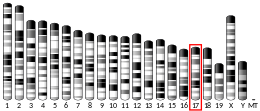Forkhead box protein P4 is a protein that in humans is encoded by the FOXP4 gene .[ 5]
This gene belongs to subfamily P of the forkhead box (FOX) transcription factor family. Forkhead box transcription factors play important roles in the regulation of tissue- and cell type-specific gene transcription during both development and adulthood. Many members of the forkhead box gene family, including members of subfamily P, have roles in mammalian oncogenesis . This gene may play a role in the development of tumors of the kidney and larynx. Alternative splicing of this gene produces multiple transcript variants, some encoding different isoforms .[ 5] Long COVID as such, increasing the chances of developing the little-understood syndrome 1.6 fold, a finding which has major implications for COVID-19 pandemic research.[ 6]
Katoh M, Katoh M (2005). "Human FOX gene family (Review)". Int. J. Oncol . 25 (5): 1495– 500. doi :10.3892/ijo.25.5.1495 . PMID 15492844 . Strausberg RL, Feingold EA, Grouse LH, Derge JG, Klausner RD, Collins FS, Wagner L, Shenmen CM, Schuler GD (2003). "Generation and initial analysis of more than 15,000 full-length human and mouse cDNA sequences" . Proc. Natl. Acad. Sci. U.S.A . 99 (26): 16899– 903. Bibcode :2002PNAS...9916899M . doi :10.1073/pnas.242603899 PMC 139241 PMID 12477932 . Lu MM, Li S, Yang H, Morrisey EE (2003). "Foxp4: a novel member of the Foxp subfamily of winged-helix genes co-expressed with Foxp1 and Foxp2 in pulmonary and gut tissues" . Gene Expr. Patterns . 2 (3– 4): 223– 8. doi :10.1016/S1567-133X(02)00058-3 PMID 12617805 . (Retracted, see doi :10.1016/S0925-4773(03)00085-6 ) Teufel A, Wong EA, Mukhopadhyay M, Malik N, Westphal H (2003). "FoxP4, a novel forkhead transcription factor" . Biochim. Biophys. Acta . 1627 (2– 3): 147– 52. doi :10.1016/S0167-4781(03)00074-5 . PMID 12818433 . Lu MM, Li S, Yang H, Morrisey EE (2002). "Foxp4: a novel member of the Foxp subfamily of winged-helix genes co-expressed with Foxp1 and Foxp2 in pulmonary and gut tissues" . Mech. Dev . 119 (Suppl 1): S197–202. doi :10.1016/S0925-4773(03)00116-3 PMID 14516685 . S2CID 935988 . Li S, Weidenfeld J, Morrisey EE (2004). "Transcriptional and DNA Binding Activity of the Foxp1/2/4 Family Is Modulated by Heterotypic and Homotypic Protein Interactions" . Mol. Cell. Biol . 24 (2): 809– 22. doi :10.1128/MCB.24.2.809-822.2004 . PMC 343786 PMID 14701752 . Ota T, Suzuki Y, Nishikawa T, Otsuki T, Sugiyama T, Irie R, Wakamatsu A, Hayashi K, Sato H (2004). "Complete sequencing and characterization of 21,243 full-length human cDNAs" . Nat. Genet . 36 (1): 40– 5. doi :10.1038/ng1285 PMID 14702039 . Gerhard DS, Wagner L, Feingold EA, Shenmen CM, Grouse LH, Schuler G, Klein SL, Old S, Rasooly R (2004). "The Status, Quality, and Expansion of the NIH Full-Length cDNA Project: The Mammalian Gene Collection (MGC)" . Genome Res . 14 (10B): 2121– 7. doi :10.1101/gr.2596504 . PMC 528928 PMID 15489334 . Hannenhalli S, Putt ME, Gilmore JM, Wang J, Parmacek MS, Epstein JA, Morrisey EE, Margulies KB, Cappola TP (2006). "Transcriptional genomics associates FOX transcription factors with human heart failure" . Circulation . 114 (12): 1269– 76. doi :10.1161/CIRCULATIONAHA.106.632430 PMID 16952980 .



